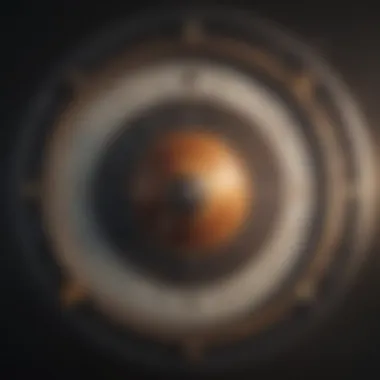Understanding Your Zodiac Placements: A Comprehensive Guide


Intro
This article will guide you through the various components of your zodiac placements. We will cover the characteristics of each zodiac sign, delve into the importance of daily horoscopes, and unravel the subtleties of love and relationships. Furthermore, we shall explore how to interpret birth charts, discuss significant astrological events, and offer a primer for beginners in astrology.
With a structured approach, you will learn to unlock insights about yourself and those around you, granting you a clearer perspective on life’s complexities.
Preamble to Zodiac Placements
The relevance of examining zodiac placements cannot be understated. They offer detailed information about various components of an individual’s character. For instance, the sun sign often indicates one’s core identity, while the moon sign reveals emotional nature and inner motivations. The rising sign, or ascendant, affects how one projects themselves to the world.
- Self-Discovery: Deepening awareness of personal traits and tendencies.
- Personal Growth: Identifying areas for improvement or strengths to develop further.
- Relationship Insights: Understanding compatibility with others through their astrological profiles.
- Life Navigation: Making informed decisions in career and personal choices based on astrological insights.
Overall, this section serves as a primer. It lays the groundwork for deeper exploration into each zodiac placement, encouraging a nuanced understanding of astrological influences.
Defining Zodiac Placements
Zodiac placements include the positions of the sun, moon, and planets at the time of one’s birth. Each celestial body occupies a specific sign and house, contributing to the complexities of an astrological profile. The sun sign is the most recognized aspect, representing one’s core self. Conversely, the moon sign indicates emotional needs and instinctual behavior, while the rising sign reflects outward behavior and first impressions.
What is essential to grasp is that each placement is interconnected. The sun's energy can be influenced by the moon's emotions and the rising sign's persona. This interrelationship creates a multi-dimensional understanding of individual personality.
Relevance of Zodiac Placements in Astrology
Zodiac placements go beyond casual horoscopes. They are central to astrological analysis, offering insights that enable practitioners to evaluate various aspects of life. Placing significance on these placements enhances one's awareness about how celestial patterns may influence personal experiences.
- Influence on Personality: Each zodiac sign has distinct traits and characteristics. For example, the determination of a Capricorn may be influenced by a fiery Aries moon, creating a complex personality with both ambition and impulsivity.
- Predictive Significance: Astrologers can utilize placements to forecast potential trends or challenges in a person’s life, often relating them back to the current positioning of planets in the universe.
- Holistic Understanding: A complete astrological reading considers not just the sun sign, but the multitude of placements that shape the individual.
Such complexity in zodiac placements facilitates a richer experience of astrology for both the practitioner and the individual seeking guidance. This nuanced framework for interpretation creates a road map for personal growth and self-exploration.
The Essential Components of Your Zodiac Profile
Understanding the various components of your zodiac profile is crucial for a deeper grasp of your astrological identity. These components, primarily consisting of your Sun sign, Moon sign, and Rising sign (or Ascendant), shape instances of your personality, emotional responses, and how you present yourself to the world. Each element provides insights into distinct facets of your being, making it imperative to explore them individually and how they interact with one another.
Understanding the Sun Sign
The Sun sign, perhaps the most well-known aspect of astrology, represents your core identity and essence. It is determined by the position of the sun at your birth and is often seen as a backbone of your character. This astrological sign encapsulates your fundamental traits, innate qualities, and your approach to life. For many, it reflects their conscious mind and the role they play in social contexts.
For instance, if your Sun sign is Pisces, you might be perceived as intuitive and sensitive. Conversely, if you're a Capricorn, qualities such as discipline and ambition likely dominate your personality. Recognizing your Sun sign's influence helps in understanding your motivations and interactions with others. Thus, it serves as a guideline for personal development and self-awareness.
The Role of the Moon Sign
The Moon sign signifies your emotional world and subconscious reactions. While the Sun sign reveals your outer persona, the Moon sign delves into your inner self. It highlights how you react under stress, your emotional needs, and what makes you feel secure. The position of the moon at the time of your birth contributes to this understanding.
For example, a Moon in Scorpio may indicate a deep, intense emotional landscape where feelings are felt profoundly. In contrast, a Moon in Libra may exhibit a preference for harmony and balance in emotional exchanges. Understanding your Moon sign can enhance emotional intelligence and help articulate feelings effectively in relationships.
Deciphering the Rising Sign (Ascendant)
The Rising sign, or Ascendant, represents how you emerge to the world, often informing first impressions. Unlike the Sun and Moon, which delve deeper into essence and emotion, the Rising sign is about identity projection. It reflects your style, how you approach new experiences, and your initial demeanor in social situations.
For instance, if you have a Rising sign in Gemini, you may come across as witty and engaging, often drawing people to you effortlessly. In contrast, a Taurus Rising might present a more grounded and stable image. The Ascendant adds complexity to interacting with others and can influence how one is perceived in interpersonal relationships.
"Your zodiac placements dictate not solely who you are but also how you interface with the world."
How to Determine Your Zodiac Placements


Determining your zodiac placements is vital for genuinely understanding astrology's role in your life. Your placements provide insights into your personality, emotions, and reactions. Without knowing these aspects, one's grasp of astrology may remain superficial. In this section, we will explore the necessary steps and tools to accurately uncover your unique astrological profile.
Collecting Necessary Information
To begin with, collecting the right information is essential. You need accurate data on your birth date, time, and location. These elements are pivotal in forming a detailed natal chart.
- Birth Date: This tells you your sun sign.
- Birth Time: This information determines your rising sign or ascendant and can greatly influence your natal chart.
- Birth Location: Where you were born affects the planetary positions in your chart.
Gathering this data might seem simple, but inaccuracies in birth time or location can lead to misinterpretations. A precision in time is especially crucial, as even a few minutes can alter the placement of your ascendant and other aspects.
Using an Astrology Calculator
After gathering your information, the next step involves using an astrology calculator. These tools streamline the process of generating your natal chart. There are various online platforms available that cater to users with different levels of expertise.
- Online Resources: Websites like astro.com and cafeastrology.com have user-friendly calculators. These tools can interpret the data you provide and produce a comprehensive natal report.
- Input Requirements: Be ready to input your birth details accurately. The result will show where the planets were positioned at the moment of your birth, providing you with a preference for understanding your chart.
Astrology calculators often come with explanations of your placements. However, take the time to explore and verify the results. Cross-referencing can enhance your understanding and confidence in the information.
Interpreting Your Natal Chart
Now that you have your zodiac placements laid out, interpreting your natal chart becomes the next significant step. The natal chart is essentially a map of your astrological layout, showcasing where each planet resides at the time of your birth.
- Planetary Positions: Look at the position of the Sun, Moon, and planets in relation to the twelve astrological houses. Each planet has its associated characteristics, influencing various aspects of your life.
- Elemental Focus: Observe the balance of the four elements (fire, earth, air, water) and how they manifest within your placements. This balance can indicate your emotional tendencies and interaction style.
- Ruling Planets: Understanding the ruling planets for your signs can grant deeper insights. Each sign has a ruler which contributes to its essential traits, influencing your innate behaviors.
"Your natal chart is both a reflection of the cosmic moment of your birth and an intricate guide to your potential."
Utilizing textbooks or credible astrology websites can provide detailed interpretations of each aspect of your chart. Aim to take your time with this process. Interpretation is an art that becomes refined with practice, aiding greatly in self-reflection and awareness.
Impact of Zodiac Placements on Personality
Understanding how zodiac placements influence personality is crucial for anyone interested in astrology. Each placement contributes uniquely to an individual's traits, behaviors, and emotional responses. By examining these elements, one can gain deeper insights into their own personality and those of others around them. This section discusses how the sun sign, moon sign, and rising sign each play distinct roles in shaping a person’s character.
Sun Sign Influences
The sun sign is often what people consider to be the primary zodiac sign. It represents the core of who you are, reflecting your identity, ego, and fundamental nature. People usually identify very closely with their sun sign. For instance, a Leo may embrace leadership and creativity, while a Virgo might embody traits related to attention to detail and practicality.
The sun's position in the natal chart planets show what drives you. This urge manifests in the aspirations you set and the goals you pursue. Those with a strong sun sign often feel compelled to express their inherent nature in their daily lives.
Key aspects of the sun sign's influence include:
- Motivation: What inspires you to take action.
- Self-Image: How you perceive yourself in relation to the world.
- Core Desires: What you ultimately seek in life.
The sun sign sets the stage for personal development, shaping ambitions and desires.
Moon Sign and Emotions
The moon sign, in contrast, governs the emotions and inner feelings. It reflects how you react in personal and private situations. This placement offers insight into emotional responses and how one deals with unprepared circumstances. For example, a Taurus moon may display a need for comfort and security, while a Sagittarius moon could show a tendency towards optimism and freedom.
Understanding the moon sign can unveil a lot about inner conflicts and emotional patterns. It reveals where comfort is sought and how one finds peace in the chaos of life. When analyzing relationships, the moon sign plays a significant role in understanding emotional compatibility.
Considerations regarding the moon sign include:
- Emotional Reactions: How you express feelings in personal relationships.
- Instinctual Responses: The immediate reactions during heightened emotional states.
- Comfort Zones: Identifying what brings emotional stability.
Rising Sign and First Impressions


The rising sign, or ascendant, is the zodiac sign that was on the horizon at the time of your birth. It serves as the outward expression of oneself, affecting first impressions and how others perceive you. The ascendant acts as a mask, conveying not necessarily who you are on the inside but how you present yourself to the world.
For example, someone with an Aries rising might come across as assertive and energetic, while someone with a Pisces rising may appear more gentle and dreamy. This sign can guide one's approach to life and how they approach new experiences.
Think about these aspects of the rising sign:
- First Impressions: How you are perceived by strangers or initial encounters.
- Exterior Behavior: The persona you project in public settings.
- Approach to New Situations: Your instinctual responses to new opportunities and challenges.
Understanding these three core components in the analysis of zodiac placements allows for a richer, more rounded perspective on personality. When all are considered together, a comprehensive view emerges, revealing the complexity and uniqueness of each individual. This multi-faceted understanding not only informs self-awareness but enhances relationships with others.
Zodiac Signs and Their Characteristics
Understanding Zodiac signs is foundational in astrology. They reveal the characteristics tied to each sign, influencing our behaviors, emotions, and interactions. Each sign embodies distinct traits shaped by its elemental, modal, and planetary associations. By recognizing these qualities, individuals can gain insights into their personal attributes and tendencies, enhancing their self-awareness and relationships.
Elemental Correspondences
The Zodiac comprises four elements: Fire, Earth, Air, and Water, each representing specific traits.
- Fire Signs (Aries, Leo, Sagittarius) are known for passion, energy, and enthusiasm. They often inspire others through their bold nature.
- Earth Signs (Taurus, Virgo, Capricorn) embody practicality, stability, and material focus. They are often grounded and reliable individuals.
- Air Signs (Gemini, Libra, Aquarius) thrive on intellectual engagement and communication. They are sociable and adapt quickly to change.
- Water Signs (Cancer, Scorpio, Pisces) connect deeply with emotions and intuition, often representing sensitivity and empathy.
Each sign’s element influences its approach to life and relationships. Fire, for instance, tends to be spontaneous while Earth may seek security. Recognizing these elemental characteristics helps individuals align with their natural tendencies.
Modality and Its Importance
In astrology, modality describes how signs express their elemental traits. There are three modalities: Cardinal, Fixed, and Mutable.
- Cardinal Signs (Aries, Cancer, Libra, Capricorn) initiate change and projects. They are leaders, constantly aiming to forge new paths.
- Fixed Signs (Taurus, Leo, Scorpio, Aquarius) provide stability and persistence. They tend to uphold traditions and resist abrupt changes.
- Mutable Signs (Gemini, Virgo, Sagittarius, Pisces) are adaptable and flexible, tending to flow with life’s changes.
Understanding modalities adds another layer of depth. It helps explain why certain signs respond differently to challenges or opportunities. These traits significantly shape interactions and personal growth.
Planetary Rulership
Each Zodiac sign is governed by a planet that influences its energies and attributes.
For example, Mars rules Aries, embodying aggression and drive, while Venus rules Taurus and Libra, emphasizing love and beauty. Mercury leads Gemini and Virgo, fostering communication and intellect.
Understanding planetary rulership allows for deeper character assessments:
- Individuals under Mars may exhibit competitiveness and boldness.
- Those ruled by Venus might prioritize relationships and aesthetics.
This knowledge enhances personal insights and relationship dynamics based on the ruling planet's influence. By learning these connections, astrologers can provide nuanced readings and guidance based on their charts.
Advanced Considerations in Zodiac Placement Analysis
The Significance of Houses
In astrology, the concept of houses is essential. Each house represents a different area of life, such as career, relationships, or home and family. There are twelve houses, and each one corresponds to specific zodiac signs that influence various life aspects. For instance, the First House represents self-image, while the Seventh House deals with partnerships.
The placement of planets in these houses plays a crucial role in shaping how individuals experience these life areas. A planet residing in the Fourth House may signify an emphasis on home and family, whereas activity in the Tenth House may enhance one's career aspirations. Thus, understanding which sign governs a house and its planetary influences can yield insights into personal strengths and challenges.
"Houses offer context to zodiac placements, highlighting where your astrological energies manifest in daily life."
Transits and Progressions


Transits are the current positions of planets and how they interact with your natal chart. This dynamic aspect of astrology can reveal potential changes or challenges in one's life. For example, a significant transit from Saturn might suggest a period of hard work or responsibility. Notably, the influence of a transit can vary widely depending on the individual's zodiac placements and the aspects formed with natal planets.
Progressions, on the other hand, represent the evolution of your natal chart over time. In progression, each year of life is equated to a day in the zodiac. This technique allows astrologers to discern how a person's life experiences and personality can shift as they mature.
By paying attention to both transits and progressions, one gains tools for self-reflection and preparation for future opportunities or challenges. This active engagement with astrological cycles can empower individuals to make well-informed decisions that resonate with their authentic selves.
Understanding these advanced considerations can enhance your grasp and application of zodiac placements, ultimately leading to richer insights into your life path.
Practical Applications of Understanding Zodiac Placements
Understanding zodiac placements extends beyond mere curiosity about astrological signs. It serves as a practical tool for personal growth and decision-making. By examining different placements, individuals can gain insights into their inherent strengths, weaknesses, and tendencies. This understanding opens doors to self-awareness, enhances relationship dynamics, and informs career paths.
Enhancing Self-Awareness
Self-awareness is a foundational element of personal development. Zodiac placements play a vital role in fostering this awareness. By understanding your sun, moon, and rising signs, you can dive deeper into your core identity, emotional responses, and outward behavior.
It allows for a more profound reflection on how these signs influence your motivations and actions in daily life.
- Sun sign offers insights into your core essence and life purpose.
- Moon sign reveals emotional needs and instinctual reactions.
- Rising sign reflects first impressions and social demeanor.
Enhancing self-awareness provides a pathway to emotional intelligence. When you recognize your patterns, it becomes easier to manage emotional responses and interactions with others. For instance, someone with a Libra moon may prioritize harmony in relationships, while a Scorpio rising might present a more intense persona initially. Understanding these differences can lead to better emotional regulation and self-acceptance.
Improving Relationships
Zodiac placements significantly impact relationships, shaping how individuals connect, communicate, and confront challenges. Each sign comes with unique traits that influence interpersonal dynamics. By examining the placements in your own chart and those of others, you can adapt your approach.
For example:
- A person with a Gemini sun may thrive on intellectual conversations, while someone with a nurturing Cancer moon may prefer deeper emotional exchanges.
- Knowing about these preferences can help tailor communication styles to enhance dialogue.
This understanding also helps identify potential areas of conflict. If a partner has a fiery Aries sun while you possess a serene Taurus moon, friction may arise due to contrasting energy levels. Recognizing such differences fosters empathy and encourages finding common ground, leading to healthier and more productive relationships.
Navigating Career Choices
Zodiac placements provide valuable insights that can guide career paths. Specific signs have strengths aligned with certain professions. Individuals can better decide their career trajectory based on their astrological profiles.
For instance, an Aquarius sun may lean toward innovation and creativity, leading to success in technology or humanitarian efforts. Conversely, a Capricorn moon might suit roles requiring leadership and discipline, such as management or finance.
When coupled with knowledge about planetary positions and houses, this understanding can direct individuals toward fulfilling career endeavors that align with their true selves. Choosing a career that resonates with one's astrological placements not only boosts job satisfaction but also enhances productivity and performance.
"Astrology provides a map for understanding personal tendencies and making more informed choices about life and relationships."
Overall, applying insights gained from zodiac placements encourages holistic engagement with life, promoting growth across all facets.
Culmination and Further Exploration
The exploration of zodiac placements offers profound insights into one's personality and life path. Understanding how various components—such as the Sun, Moon, and Rising signs—interact enables individuals to recognize not just their traits, but also their intrinsic strengths and weaknesses. This understanding is essential for personal growth and self-awareness. Through this framework, one can better navigate challenges in relationships, career choices, and emotional health.
Ultimately, this concluding section serves as a reminder of the journey of self-discovery. It emphasizes the continued exploration and learning that astrology involves. Zodiac placements are not static; rather, they interact with life experiences and choices, shaping the individual along the way.
"Astrology is a language. If you understand this language, the sky speaks to you."
— Dane Rudhyar
Summarizing Key Insights
Understanding zodiac placements is more than just knowing one’s Sun sign. Here are vital takeaways:
- Zodiac Components: The Sun, Moon, and Rising signs combine to create a complex profile that influences one’s personality and behavior.
- Assessment Tools: Astrology calculators and natal charts are essential tools for accurate placement determination.
- Practical Applications: Knowledge gained from understanding zodiac placements can significantly enhance self-awareness and improve relationships.
- Ongoing Learning: Astrology is an evolving field, encouraging continuous exploration and learning.
Resources for Continued Learning
For those who wish to find deeper knowledge in astrology, several resources can be beneficial:
- Books: "The Only Astrology Book You’ll Ever Need" by Joanna Martine Woolfolk offers a comprehensive guide.
- Websites: Astro.com provides tools and insights into your natal chart.
- Communities: Platforms such as Reddit have communities where enthusiasts share insights and findings.
- Articles: The Wikipedia page offers a historical overview and basic concepts of astrology.
Engaging with these resources facilitates not only an understanding of one's placements but also informs the astrological community and its collective knowledge. As you continue your journey, always remain open to new interpretations and understandings.







